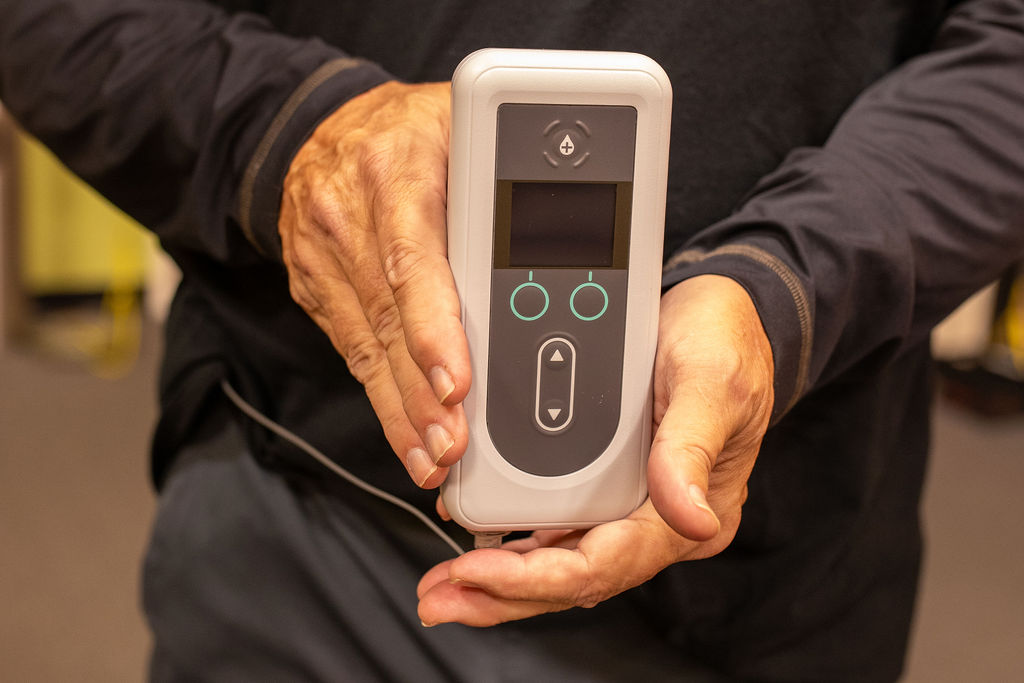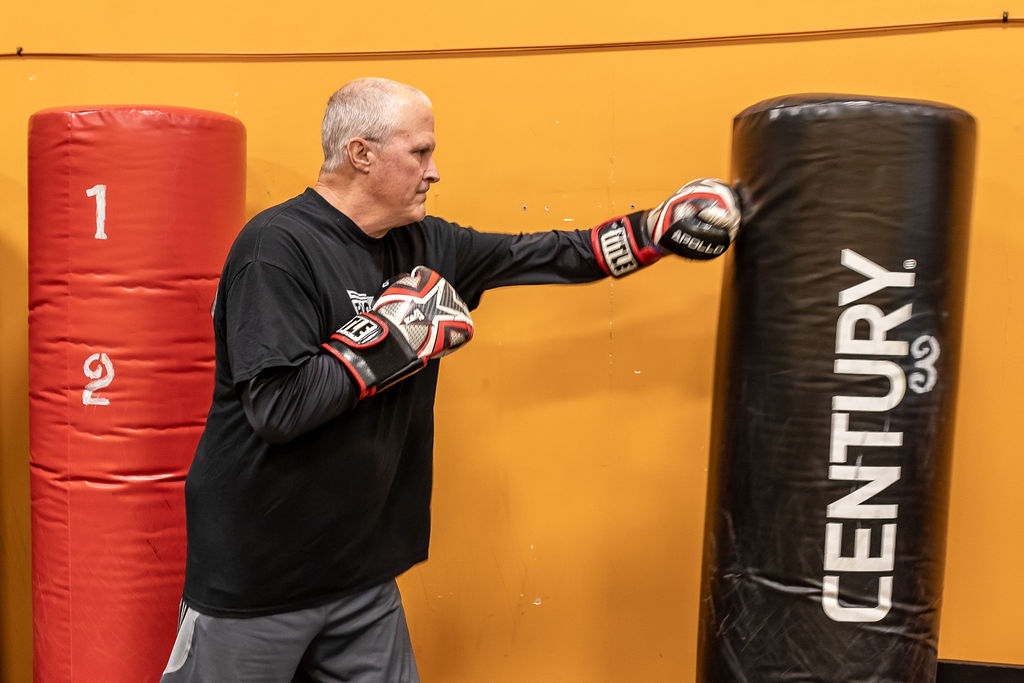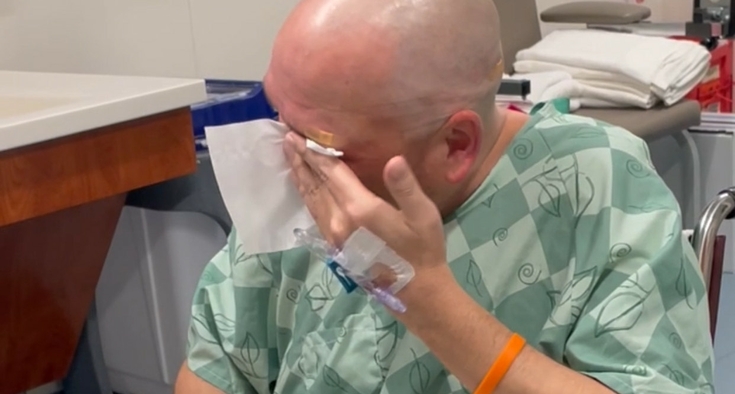Lou Morris battles advanced Parkinson's disease with a solid one-two punch.
Not only does he fight it in a boxing gym, the Matthews, North Carolina, bank executive is also among the first patients nationwide being treated with a Parkinson's medication delivered continuously, 24/7, through a patch on his belly and a programmable pump roughly the size of a large cellphone.

Vyalev, a liquid form of the drugs levodopa and carbidopa, was approved for patients with advanced Parkinson's in October 2024. (It’s pronounced: VIE-a-lev.)
While levodopa has long been the go-treatment for Parkinson's, a degenerative brain disease affecting as many as 1 million Americans, the pills often wear off between scheduled doses, especially as the disease progresses.
Many patients need one every few hours to try to keep slowness, tremors, stiffness, shaky balance and other debilitating symptoms at bay. The challenge is establishing consistency. As each dose wears off throughout the day, people with Parkinson’s often feel like they’re walking up a hill — struggling more as the medication fades, then finding some relief when the next dose kicks in.

"With pills, it's almost like being on a four- or five-hour gas tank and running out of gas," said Morris' neurologist Dr. Robert Wiggins, a movement specialist at Novant Health Neurology & Sleep - Midtown in Charlotte. "With the new pump, if Mr. Morris has a more active day — which we very much encourage, because exercise slows the progression of Parkinson's — rather than having to conserve his gasoline, he can push a button and give himself a little extra."
Holistic care for movement disorders.
Morris, 61, got his pump in November 2024, and he couldn't be more pleased with the infusion treatment.
Before, he'd be fine for a couple of hours after taking his pill. But as it wore off, a tremor in his right arm would return, making it hard to do routine tasks like jotting notes as a senior vice president at Wells Fargo in Charlotte.
As his words dissolved into a hoarse whisper, he found it increasingly hard to lead meetings, respond to clients and work with partners on new initiatives. He would shuffle stiffly across the floor from one meeting to the next. He'd take another pill, then wait a quarter-hour or more for the benefit to kick in. Though colleagues were understanding and supportive and continue to be with Morris out on leave, the up and downs made everything harder.
Now, with a sure supply of medication delivered to his brain around the clock, the highs and lows have leveled out. "The game-changer for me is consistency," Morris said. "I'm no longer having to manage the unpredictability of the pills. I don't ride that rollercoaster up and down all day."
That's because levels of levodopa, the active ingredient in Vyalev, stay steadier. When levodopa reaches the brain, it's converted into a chemical messenger called dopamine, which plays a key role in governing movement, memory and mood.
Parkinson's disease by the numbers
- About 90,000 Americans are diagnosed with Parkinson's each year.
- Diagnoses are expected to double by 2040.
- Most patients are 60 or older, but up to 10% are under 50.
- Parkinson's is the second most-common neurodegenerative disease, behind Alzheimer's.
Source: National Institute of Neurological Disorders and Stroke
Soon after the U.S. Food and Drug Administration approved Vyalev in October, Wiggins recommended it to Morris, and he agreed to give it a go.
Morris was an ideal candidate, Wiggins said. That's because he responded well to levodopa but was experiencing ups and downs that a continuous infusion could even out. Both men have been pleased with the results so far. "We doctors have been waiting for this for a long time," Wiggins said, noting that the formulation was already available to patients in Europe, where it is called Produodopa.
Once Morris learned to prepare the syringe and the pump and then to insert a thin tube called a cannula through a patch placed on his abdomen, administering Vyalev became an easy evening routine, he said. Because of the way Wiggins set up his pump, Morris can adjust his dose, if needed, with a quick punch of a button.
But that's not all he punches.

He works out three or four times a week with a non-contact boxing program called Rock Steady Boxing that he heard about seven years ago from a friend of a friend. Launched in Indianapolis in 2006, it's offered in 50 gyms nationwide, including seven within 50 miles of Charlotte. It's designed to help patients with Parkinson's fight back.
In a video posted on its website, a Rock Steady instructor explains to CBS reporter Lesley Stahl (whose husband has Parkinson's) that the workouts include stretching, footwork for balance, pounding a punching bag to steady tremors, shouting to counter soft voice syndrome and sparring for coordination. (To be clear, it’s a non-contact program. No one is getting punched.)
It's a perfect prescription for Morris, who enjoys being active. "My wife Allison and I are both athletes, and just like with any workout, you feel good afterward," he said, adding that boxing has had other benefits he didn't foresee.
"Having to remember punch combinations is another way to exercise my brain, while I am doing physical activity," Morris said. “And there is a sense of community. Everyone in the class is in the same boat and we support each other, celebrating the highs and managing the lows.”
Morris also stays active by working out in his home exercise room, but his real passion is pickleball. He plays outdoors and looks forward to warmer weather and getting back to the court.
Wiggins is looking forward, as well. He's eager to see if ongoing research will uncover more effective ways to slow the progression of Parkinson's and maybe, someday, even find a cure. "I'm excited and optimistic for the future of all our patients," he said.
Clinical trial for Vyalev
Novant Health will soon begin recruiting patients to participate in a Phase IV clinical trial designed to find out how Vyalev performs in a real-world environment and what its benefits are. The nationwide trial is expected to begin in the spring.
"There is a lot of room for hope and optimism in Parkinson's disease," said movement specialist Dr. Robert Wiggins. "We're trying to offer the newest, most effective and safest therapies to patients as soon as they become available."
Patients can get more information about the trial from their Novant Health neurologist.












